
Aporandria is a monotypic moth genus in the family Geometridae described by Warren in 1894. Its single species, Aporandria specularia, was first described by Achille Guenée in 1857. It is found in Sri Lanka, India, Vietnam, Thailand, the Andamans, Peninsular Malaysia, Sumatra, Borneo, the Philippines and Sulawesi.
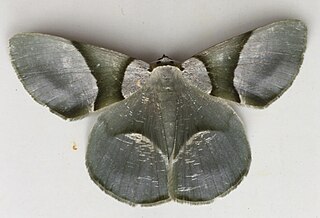
Calleremites is a monotypic moth genus in the family Geometridae. Its only species, Calleremites subornata, is found in China, Sikkim in India and Myanmar. Both the genus and species were first described by William Warren in 1894 and it has only been seen three times since then, the latest in a forest in northern Myanmar.
Eschatarchia is a monotypic moth genus in the family Geometridae. It contains only one species, Eschatarchia lineata, which is found in Japan, China, Taiwan and Myanmar. Both the genus and species were first described by Warren in 1894.

Eutrapela is a genus of moths in the family Geometridae. It contains only one species, Eutrapela clemataria, the curve-toothed geometer moth or purplish-brown looper, which is found in North America, where it has been recorded from Nova Scotia to Florida, west to Texas and north to Saskatchewan. The habitat consists of deciduous and mixed woodlands.

Lomographa is a genus of moths in the family Geometridae. The genus was erected by Jacob Hübner in 1825.

Nepheloleuca, is a genus of moths in the family Geometridae erected by Arthur Gardiner Butler in 1883. The genus includes twelve species, similar in appearance, yet different in ground color and with minor variations in markings. Nepheloleuca species occur on the Caribbean islands of Haiti, Cuba and Jamaica, but also on mainland South America.

Synegia is a genus of moths in the family Geometridae. It was described by Achille Guenée in 1857.

Sterrhinae is a large subfamily of geometer moths with some 3,000 described species, with more than half belonging to the taxonomically difficult, very diverse genera, Idaea and Scopula. This subfamily was described by Edward Meyrick in 1892. They are the most diverse in the tropics with the number of species decreasing with increasing latitude and elevation.
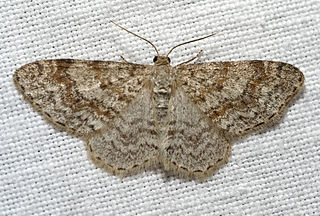
Asthenini is a tribe of geometer moths under subfamily Larentiinae first described by Warren in 1893. The tribe has been combined with Eupitheciini in the past, most notably by Jeremy Daniel Holloway in his work The Moths of Borneo.
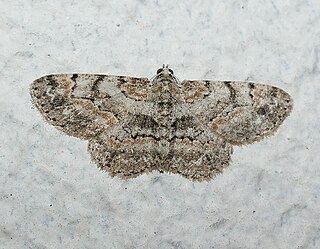
Iridopsis ephyraria, commonly known as the pale-winged gray, is a species of moth in the family Geometridae. The species was first described by Francis Walker in 1860. It is found in the United States and southern Canada east of the Rocky Mountains, from New Brunswick to Florida, west to Texas and north to Alberta.
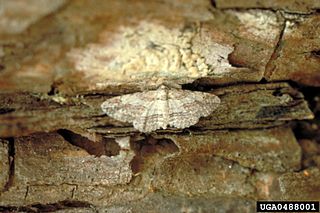
Iridopsis pergracilis, the cypress looper moth, is a moth of the family Geometridae. The species was first described by George Duryea Hulst in 1900. It is found in the US from Maryland to Florida.

Iridopsis clivinaria, the mountain mahogany looper moth, is a moth of the family Geometridae. It is found from British Columbia south to California and east to Idaho, Colorado and Arizona.
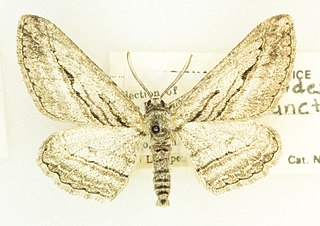
Iridopsis sanctissima is a species of moth in the family Geometridae first described by William Barnes and James Halliday McDunnough in 1917. It is found in Central and North America, where has been recorded from Nevada, Arizona, California and northern Baja California.

Iridopsis humaria, the small purplish gray, is a species of geometrid moth in the family Geometridae.
Iridopsis perfectaria is a species of geometrid moth in the family Geometridae.
Iridopsis cypressaria is a species of geometrid moth in the family Geometridae.

Iridopsis obliquaria, the oblique looper moth, is a species of geometrid moth in the family Geometridae.

Iridopsis fragilaria is a species of geometrid moth in the family Geometridae. It is found in Central America, North America, and Oceania.

Iridopsis vellivolata, the large purplish gray, is a species of geometrid moth in the family Geometridae. It is found in North America.

Iridopsis larvaria, the bent-line gray, is a species of geometrid moth in the family Geometridae. It is found in North America.


















